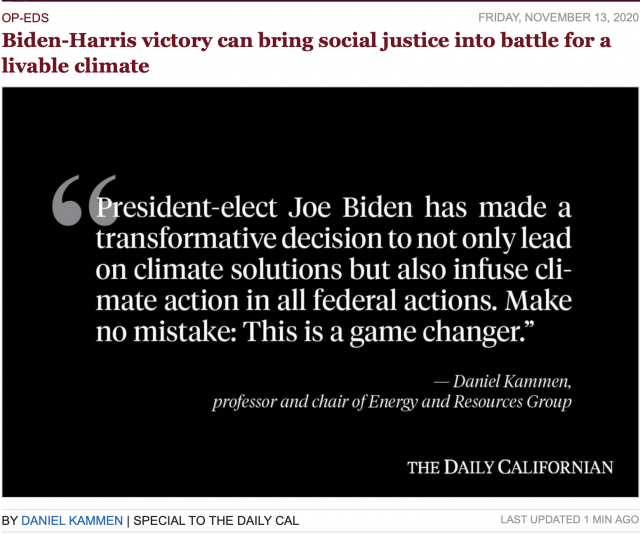NEWS Biden-Harris victory can bring social justice into battle for a livable climate
From The Daily Californian, November 13, 2020. Click here for the original.
With Joe Biden and Kamala Harris’ presidential victory came an international sigh of relief. After the dismal past four years, science, social justice and both domestic and global partnerships to address climate change are now back on the agenda in the United States.
More than any one specific action, the commitment Biden has already shown to a science-driven administration is critically important domestically and worldwide.
One example of the global urgency — and, now, relief — is that in an unprecedented move, scientific journals worldwide, from Nature to Science to Scientific American, endorsed the Biden-Harris ticket. Biden further signaled his platform with a statement that the United States would rejoin the Paris Agreement, potentially on day one of the administration.
The visual of the virtual COVID-19 advisory board meeting with Biden and Harris — words that feel incredibly good to write — already shows how this administration plans to meet crises head-on. The COVID-19 pandemic critically needs this leadership after we have watched week after week of a blank White House calendar.
The climate emergency will require a similar mix of decisive and inclusive action, and the Biden-Harris administration has already previewed the many ways it is up for the task and challenge. Biden has made a transformative decision to not only lead on climate solutions but infuse climate action in all federal actions. Make no mistake: This is a game changer.
The development of the president-elect’s plan for entirely clean electricity by 2035 is particularly welcome and important because it shows how clearly innovation in science, technology and climate science factors into his plans. Solar, wind and energy storage costs have fallen dramatically this past decade, so much so that these technologies are now affordable options across the United States and much of the world.
This technological progress opens the door but alone does not ensure the energy transitions we will need to keep the 1.5 degrees Celsius limit on warming within global reach. It is the critical enabler, certainly, but it is just the start of what must be a social movement on climate change, human rights and the environment. Last year, my laboratory published a study showing that rooftop solar, for example, is dramatically underdeployed in communities of color relative to what we see in white-majority communities, even when we control for income.
Enter the other game-changing pillar of the Biden-Harris energy and climate platform: a focus on social and climate justice. The Biden-Harris plan calls for 40% of federal proposed clean energy benefits and climate protection to meet the needs of communities of color and regions in the United States not currently meeting water and air quality standards, among other underserved areas.
By acknowledging the legacy of systemic racism and translating that into an actionable federal agenda, Biden has built a critical bridge connecting the scientific push for climate protection to the social movement that it arguably must become. Giving further credence and hope to this agenda, Harris is also co-author of the landmark Climate Equity Act.
There are, of course, huge challenges facing the administration. Scaling up clean energy and social justice requires investments that may be a battle if Republicans control the Senate. This may not be the case, but even if Democrats win both runoff elections in Georgia, there is still a need to win over at least some of the more than 70 million Americans who voted for President Donald Trump in 2020.
Even without those two Senate seats, there is a great deal Biden can do to launch this chapter. Executive orders, federal procurement, utilization of a social cost of carbon in federal project evaluations and provision of the benefits of clean energy to communities that have suffered, and still suffer, from systemic racism are all widely discussed first steps.
Interestingly, Biden’s clean, social justice-driven energy platform may actually be an ideal tool to convert enough votes in the Senate. His proposed clean energy economy can and will produce millions of new and secure jobs. A green economy could offer paths to significant employment in energy efficiency, expanded solar and wind power — offshore wind being a brand new industry primed for the United States to build — hydrogen and geothermal energy. Many of these jobs could be in states that typically vote Republican, where much of the nation’s fossil fuel infrastructure is also located.
Expanding the green economy can empower disadvantaged communities and also lead to infrastructure reinvestments across the country. The oil and gas sector, for example, is well positioned to play a major role in geothermal energy, offshore wind, hydrogen production and carbon capture and storage. Investments in electric vehicle manufacturing, charging infrastructure and rebuilding mass transit all have significant social justice benefits, as does the weatherization of low-income homes. These opportunities are promising, even in the face of massive fossil fuel subsidies that must be removed.
With zero carbon emissions and clean energy targets in place for the European Union — and with China, Korea and Japan having all announced zero-carbon agendas — the international stage is bright for progress.
Most important in California, across our country and internationally, however, is the relief that the United States is now back in the fight.
Daniel Kammen is a professor and chair of the Energy and Resources Group, a professor of nuclear engineering and a professor in the Goldman School of Public Policy. He served in former president Barack Obama’s administration as Science Envoy in the State Department.

You must be logged in to post a comment.